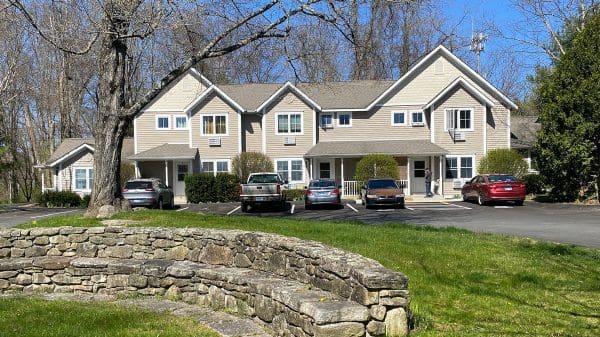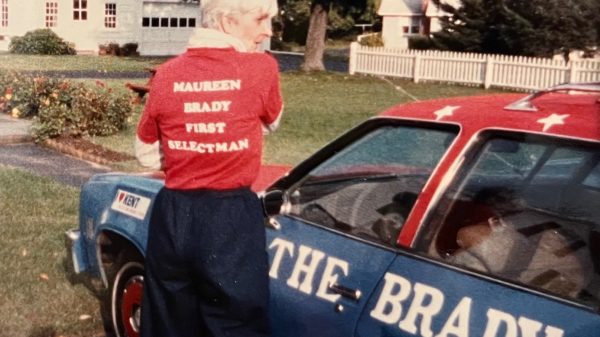KENT—The Board of Selectmen met Feb. 6 with Bernadette Ellegard, Charmaine Leone and cemetery sexton Tammy Potter, representatives of the Kent Cemetery Association, to discuss dissolution of the association and the transfer of its duties to the town.
During the meeting, the Selectmen reviewed a proposed ordinance, regulations, the transfer of the association’s funds, and a job description and possible annual salary for the sexton.
First Selectman Marty Lindenmayer said the aim is to have an ordinance establishing a town cemetery committee that is sufficiently broad to encompass all the potential activities.
Town Counsel Randy DiBella explained, “We want to have an ordinance that takes over the obligations of the cemetery association and delegates them to a town committee. That committee should be the entity to create bylaws and regulations. You don’t want the ordinance to have that kind of detail because every time you want to change anything, you would have to warn a public meeting.”
The proposed ordinance calls for a five-member committee and members of the association wondered if enough volunteers can be found. So far, they have identified only one person who would be willing to serve.
Lindenmayer said if sufficient volunteers cannot be found, the Selectmen would have to be appointed until others can be found.
Questions arose about the disposition of the money currently held by the cemetery association and whether the new town committee would have the ability “to write a check” from those funds. It was explained that the committee would operate like any other town department with an annual budget.
Treasurer Barbara Herbst said that the annual budgetary appropriation would revert to the general fund if unexpended during the fiscal year, but that the cemetery association’s funds would be placed in a special, non-lapsing account. Budgetary surpluses could not be assigned to that special fund, however.
Assumption of cemetery expenses will not be wholly new to the town. At present, the municipal budget includes a grant of about $44,000 to assist with the mowing and trimming of the seven cemeteries under the purview of the association. That sum rarely covers regular maintenance and the association supplements it from its own reserves.
The other revenue stream comes from funds the association has collected over its 100-year history and is used for special projects such as installing new fencing around St. Andrew’s cemetery, replacing the stone pillars at the Skiff Mountain cemetery, and straightening the tilting obelisk in St. Andrew’s cemetery that was in danger of toppling over.
Recently, the association has undertaken computerized mapping of two of the town’s cemeteries—Flanders and the one behind the First Church Congregational—where most burials take place. Older cemeteries will not, at present, be mapped because they are so old, often dating back to the 1700s, and deeds do not exist.
The cost to map the two cemeteries and to update records in a computerized form is $6,000.
Association members recently learned that they also are in charge of the Morehouse and Parcell cemeteries, although work has never been done on them. A deed for the Morehouse cemetery on Richards Road was located in a safety deposit box, but no documentation of a transfer of the Parcell’s property on Gorham Road has been located. Wording of the proposed ordinance was adjusted to include “and other cemeteries” in case such surprises occur in the future.
Discussion turned to the job description for the sexton and a proposed wage. A figure of $28,000 for an annual salary is penciled into the proposal, based on research into what other communities pay for similar positions.
Much discussion centered on whether this would be adequate. Tammy Potter, who has done the job for three decades, said the amount of work is hard to define. She estimated there are about 20 burials a year and that about eight hours are dedicated to site preparation for each interment. There are other responsibilities, however, that are harder to calculate.
She participates in about five conversations with families per burial and some of those calls are long. There is also research into where people have been buried “for families who haven’t visited for 20 years” and other duties not associated with an interment.
The Selectmen are keen to keep the weekly hours of the sexton below 29 so the town does not have to pay benefits. “But what if we get a rash of burials or a major storm that requires a lot of cleanup?” asked Lindenmayer.
“If you have a posted salary, do it by an hourly rate,” said DiBella. “If you are cleaning up after a storm, do some simple math to figure an hourly rate.”
It was suggested that fees paid by the families recompense the sexton, as is the case with building inspector fees, but Lindenmayer said he would prefer to establish a salary.




























